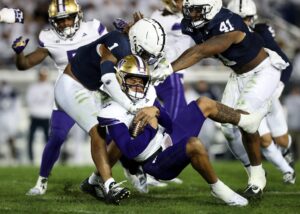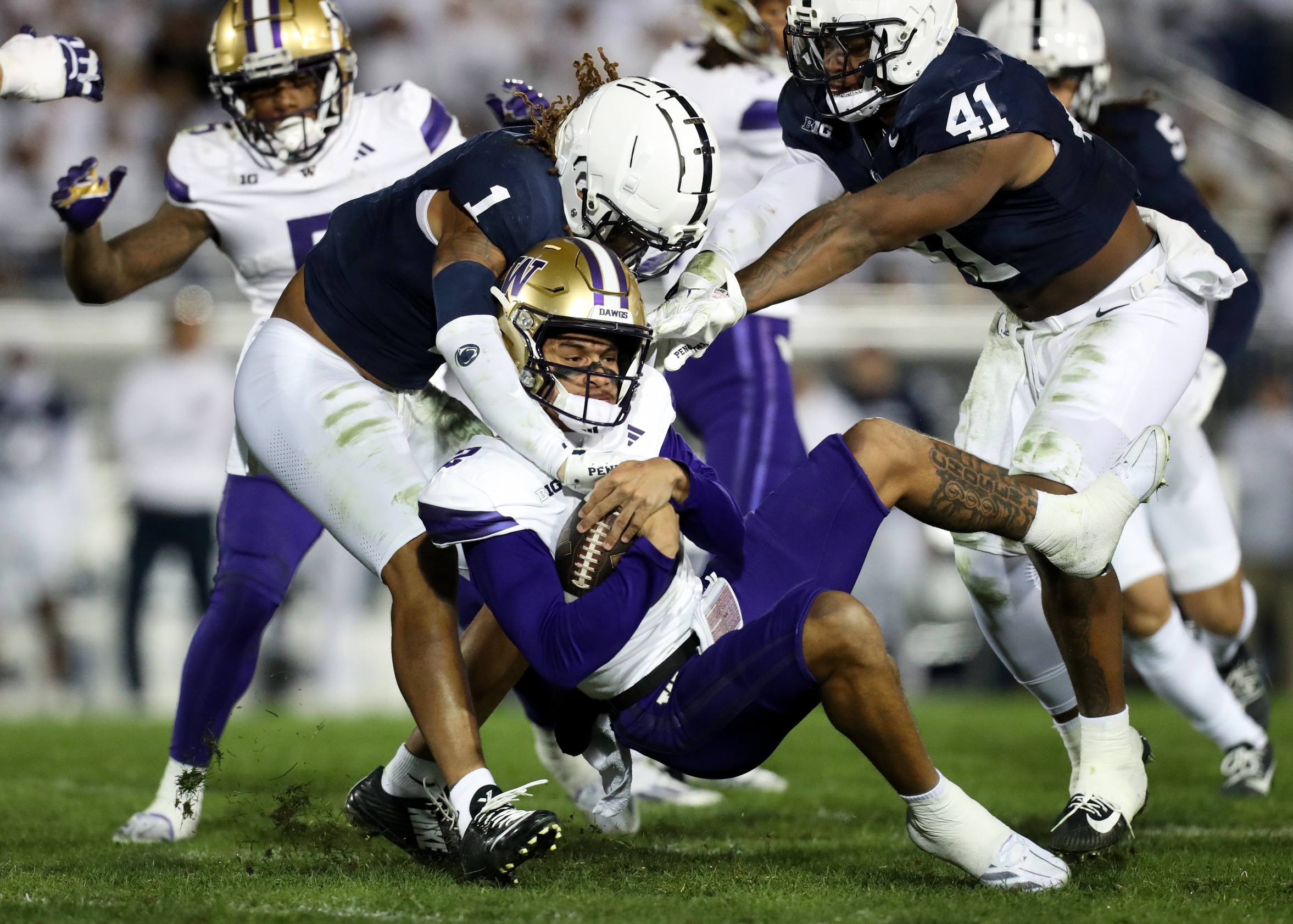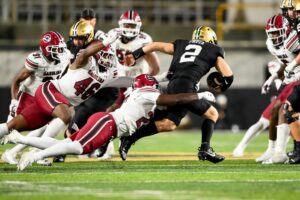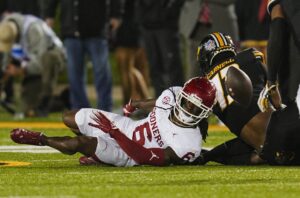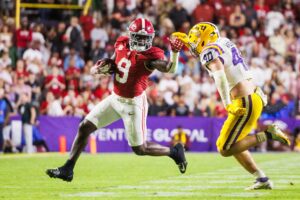Protection up front was one of the keys to Washington’s success against Penn State inside the Whiteout on Saturday night. It struggled to create it all evening inside Beaver Stadium. The Nittany Lion defensive front generated five sacks and nine tackles for loss en route to a 35-6 victory over Washington. Jedd Fisch made the move to Demond Williams Jr. after halftime. The first half offense featured just 26 plays to Penn State’s 40, and 71 total yards. The move at quarterback opened up the offense, but it wasn’t enough to overcome the strength of the Nittany Lions.
Penn State Rolls, But A Glimpse of Who’s Next at Washington
Demond Williams Jr.
After a first half where Washington failed to reach the red zone, Williams Jr. was given the nod to start the third quarter. Fisch made the move to his true freshman quarterback in hopes of creating a spark. Williams was under center for all 30 of Washington’s second-half plays. It was the most snaps he’s played in a single game all season, with 29 snaps at Iowa. In the first half, Washington’s offense averaged just 2.7 yards per play with 71 total yards. Outside of the opening drive of the game, the Husky offense did not have a drive of more than 15 yards. That changed in the second half.
Williams orchestrated three second-half drives of 28, 56, and 67 yards. With the true freshman in at quarterback, the offense averaged 4.1 yards per play. The situation of the game, being down four scores, allowed Williams to operate with very little pressure. The whiteout crowd was still electric, but the stakes were lower. Washington reached the Penn State red zone on all three drives with Williams under center after failing to reach the red zone in the first half. Two of the three drives ended with field goals. But the biggest takeaway was the impact that Williams has on the offense with his athleticism.
The Williams Effect
The Washington offense finds a third dimension when Williams is under center. The true freshman’s elusiveness extends plays and creates opportunities that otherwise would not be there. There were two situations where it was easy to see how his athleticism directly translates to opportunities.
The first of which was on a 4th and 12 play near the end of the third quarter. Washington kept its offense on the field down 28-3 with the football on the cusp of the red zone. AJ Harris brought pressure to Williams’ right side. The defender collapsed the pocket unblocked, but Williams made a play. He stepped up and twisted his body to avoid a sack and would-be turnover on downs. Williams rolled to his right and made a 30-yard pass to the end zone. As Decker DeGraaf went up for the football, he was interfered with, and Washington was awarded an automatic first down. Instead of a turnover on downs, Washington was able to keep the drive alive, ultimately putting three points on the board.
Later in the game, Williams showed off another element of his game. Zion Tracy forced pressure on Williams’ back side as he set up in the pocket. In the blink of an eye, the true freshman kicked it into gear and exploded upfield to his right. His track speed was on display as he rushed by the second level of the defense before lowering his shoulder into Tyrece Mills. It was a 43-yard gain that was created out of next to nothing. These two plays exhibit the skillset of Williams and show the element he brings to the offense that it doesn’t have otherwise.
A Promising Start
To open the game against Penn State, Washington began exactly how it needed to. After receiving the opening kickoff, the Husky offense began with a series of script plays that established rhythm. In a deafening environment, Will Rogers orchestrated a 13-play drive. The critical element of the opening drive was quick-developing pass plays. Rogers completed three of four passes where he had the football out in short order. His three completions went for 23 yards. Rogers also changed up the snap count to draw an offsides penalty, and his composure in front of 110 thousand fans was evident early on. The offense mixed in the run game on this drive as well and was aided by a defensive holding penalty.
But the possession ended in a way all too familiar for Husky fans. On third and short on the cusp of the red zone, Abdul Carter notched his first tackle for loss of the game for a loss of six yards. Grady Gross’ 45-yard field goal attempt bounced off the right upright, and Washington ended with no points.
In one of college football’s loudest environments, that opening drive quieted the crowd with four first downs. Points likely change the trajectory of the first half of the football game and establish some rhythm in the Husky offense. But Penn State took over and began its thundering performance.
Four-Straight Touchdowns
Following the missed field goal, Penn State’s offense went to work. Its first-half performance featured four drives that totaled 278 yards and 28 points. The Nittany Lions reached the red zone four times and capitalized with four touchdowns. Drew Allar was 14 of 18 in the first two quarters with 140 passing yards.
The Nittany Lion run game was the foundation of its explosive first half. It averaged 5.6 yards per rush and scored three of its four touchdowns on the ground. Backup quarterback Beau Pribula took a designed quarterback run into the end zone for the first touchdown of the game. Tight end Tyler Warren was utilized as a running back twice in the red zone. He took the direct snap for a couple of two-yard rushing scores in the second quarter. Warren finished with eight catches, 75 receiving yards, three carries, two rushing touchdowns, and two pass attempts. Penn State’s 28 straight points in the first half was the separation it needed, and it put the game out of reach.
